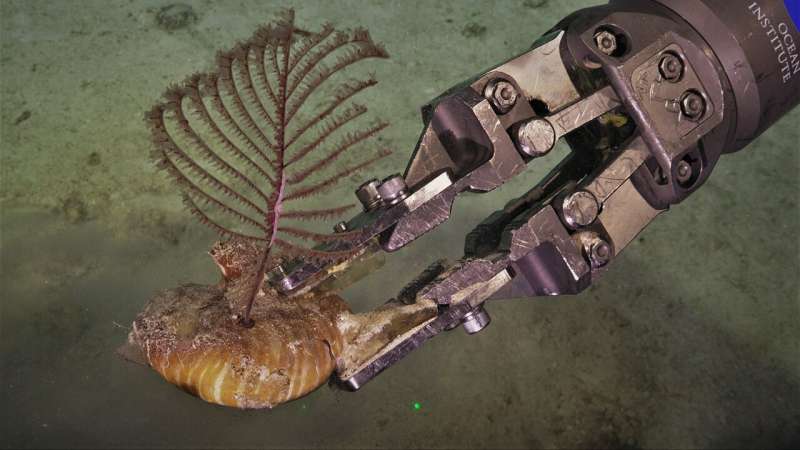This article has been reviewed according to Science X's editorial process and policies. Editors have highlighted the following attributes while ensuring the content's credibility:
fact-checked
peer-reviewed publication
proofread
History of black corals rewritten

Scientists from Queensland Museum Network and the National Museum of Natural History, Smithsonian Institution have rewritten the history of black corals, revealing their origin on the continental slopes (250–3,000 meters deep) 437 million years ago.
This discovery sheds light on the evolution of ocean life and highlights the need to protect these ancient lineages.
Lead author Dr. Jeremy Horowitz led the research as part of his Ph.D., supervised by Dr. Tom Bridge and Dr. Peter Cowman based at the Museum of Tropical Queensland in Townsville.
The paper titled "Bathymetric evolution of black corals through deep time" was recently published in the Proceedings of the Royal Society B: Biological Sciences.
Dr. Horowitz, Peter Buck Postdoctoral Fellow, National Museum of Natural History, Smithsonian Institution and Museum of Tropical Queensland Honorary, states, "The study challenges the common belief that deep-sea species evolved from shallow-water ancestors. By analyzing 83 species of black corals, we created a detailed evolutionary history dating back to the early Silurian period, approximately 437 million years ago.
"This publication is the culmination of five years of research. It required extracting and sequencing DNA from over 80 unique species. We have now amassed next-generation sequence data for over 150 unique black coral species, which is halfway to the total known number of black coral species. There is a lot of excitement around being able to study the entire coral group, to continue to understand their evolutionary history and revise the taxonomy of the group."
Dr. Bridge, Senior Scientist and Curator of Corals at Queensland Museum Network, based at Museum of Tropical Queensland and Senior Lecturer in the College of Science and Engineering, James Cook University, says, "Preserving biodiversity is crucial for maintaining ecosystem stability and resilience in the face of environmental changes. Furthermore, delving into how black corals have adapted to diverse depths over millions of years provides invaluable insights into enhancing their resilience. This newfound knowledge could play a pivotal role in our efforts to comprehend and safeguard coral species facing the challenges posed by climate change.
"This research fits into a larger puzzle of understanding the evolutionary history and ecological dynamics of deep-sea ecosystems. It contributes to our broader knowledge of how life adapts to extreme environments and the importance of preserving ancient lineages for biodiversity conservation. Knowledge about evolutionary history of corals is rare."
Dr. Cowman, principal scientist and curator, Marine Biodiversity at Queensland Museum Network, based at Museum of Tropical Queensland, says, "Using cutting-edge technologies like genome skimming, target enrichment of conserved genomic regions, and calibrating our phylogenetic trees with fossils, this research contributes to our broader understanding of evolutionary biology and deep-sea ecosystems. It paves the way for future studies and technological advancements, potentially leading to new insights and innovations in marine science.
"Black corals could also hold the key to discovering the 'fountain of youth' because they are the only known group to have avoided cancer to live for over 4,000 years. Therefore, future research on black corals, including sequencing the full genome could provide insight into why they are able to live so much longer than other coral groups, and have applications for human biomedical therapies."
More information: Jeremy Horowitz et al, Bathymetric evolution of black corals through deep time, Proceedings of the Royal Society B: Biological Sciences (2023). DOI: 10.1098/rspb.2023.1107
Journal information: Proceedings of the Royal Society B
Provided by Queensland Museum





















